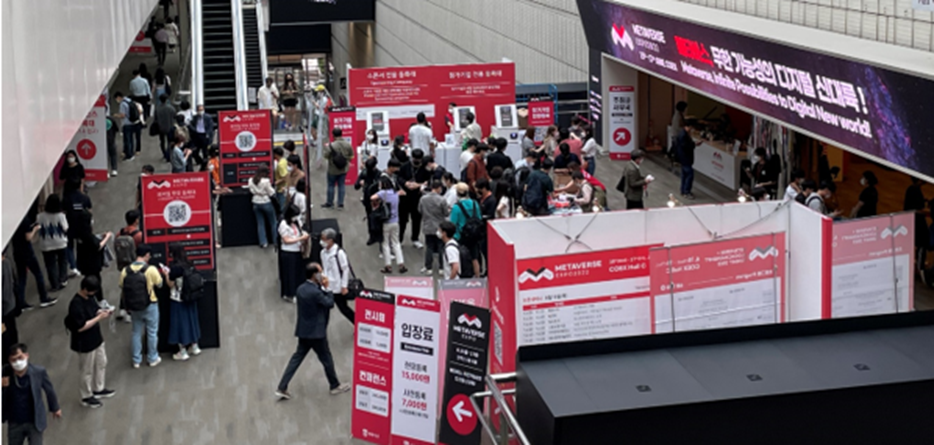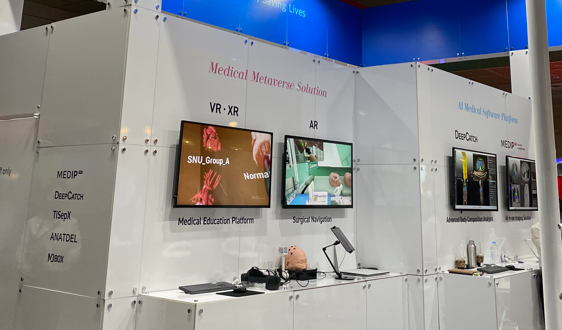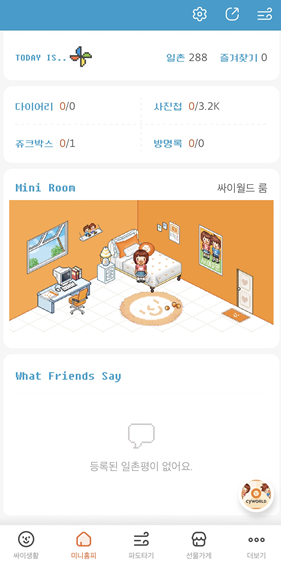Korea’s Growing Metaverse Industry and the Metaverse Expo 2022

While Korea’s economy is still not fully recovered from the pandemic, the recent Metaverse Expo 2022 which showed from June 15th to the 17th attracted over 14,000 visitors and buyers to experience and invest in new trends for the Metaverse. The show displayed metaverse platforms, NFT, software, contents, hardware, devices 5G cloud and other sectors related to the metaverse industry.
Experts believe that the metaverse’s growth rate will continue to increase as core technology developments in sectors such as 5G, VR, AR, MR and XR - which form the backbone of the industry - will catalyze growth. The MZ generation, who were born from 1981 to 2005 are more familiar with digital and information technology and early adaptors, are becoming more active in the economy. This is creating more users and consumers for the metaverse industry. While the pandemic was a disaster globally, for the metaverse industry it revealed opportunities.
With COVID-19 and social distancing regulations, the need to communicate and interact without being physically present demanded alternative environments such as the metaverse. Because COVID-19 prevented much normal physical interaction, some major universities pursued their freshmen orientations on metaverse platforms. Also, some companies opted to provide their new employee education online through a metaverse platform. BTS, the world-famous K-pop boy band, released their hit song ‘Dynamite’ through a metaverse game platform. Celebrities held fan meetings online through the metaverse where more people were able to interact with them, which was a dream come true for many fans.
In Korea, before the pandemic, the metaverse and related platforms were focused on the gaming industry. Yet there was much more to the Metaverse Expo 2022 than just games. Platforms and technology solutions were displayed for the medical, tourism, arts, and real estate industries, as well as others.

While the metaverse could seem to be a new development, for many years the four concepts that define the metaverse - Augmented Reality (AR), Lifelogging, Mirror Worlds and Virtual Worlds - were around but not well-recognized as part of the concept of the metaverse as a single, immersive new virtual world. Brief explanations of each of these follow.
1. Augmented Reality (AR)
While AR was not acknowledged as part of the metaverse to the general public, the introduction of Pokemon Go indicated opportunities for the metaverse by demonstrating the potential for widespread excitement about this new technology through the game’s launch. Domestically, Pokemon Go was not officially launched in Korea in 2016. However, due to geographical satellite coverage factors a few specific regions in Korea, such as Sokcho, a summer tourism region, did have access to play the AR game. Pokemon fans and people interested in the new game and technology all headed to Sokcho. This event caused full bookings for buses, an uncommon phenomenon even during the height of the vacation season.
2. Lifelogging
In 1999 Cyworld was introduced and quickly became one of the most popular social networking platforms in Korea. Cyworld was a platform to post memories, meet new people and communicate online through a virtual avatar interface. Throughout the years since Cyworld had its ups and downs, and was shut down for over 2 years. Recently, however, it was relaunched in a new version, as an application for mobile devices. As the metaverse started to gain attraction it garnered new interest for Cyworld, with some experts believing that Cyworld was an early prototype of the metaverse.

Source: Cyworld app
3. Mirror Worlds
While mirror worlds such as Google Earth and Naver Map are more commonly used in daily life, they are also less noticed as a part of the metaverse. These and other mapping applications are a replica of the real world in a digital space. Other related platforms include delivery apps that present a mirror world with all the restaurants that are registered for their services. In addition to location, these apps provide information specialized for food ordering such as price, reviews, restaurant information, rankings and other factors that affect purchasing food delivery services.
4. Virtual Worlds
Korea has one of the largest gaming industries in the world. The virtual worlds that have been created within this gaming industry are many. Experts believe that the business models and technology gaming companies have developed constitute advancements that can be directly applied to newly developed metaverses.
Korea’s major metaverse platform is NaverZ’s Zepeto, which has over 300 million users. Zepeto is a 3D metaverse platform where users can create, play, and grow their digital presence. Zepeto has ambitions to become the number one metaverse platform in the world. 90% of its users are from countries other than Korea, including K-pop fans all over the world. At present Zepeto is the largest metaverse platform in Asia, and includes major fashion brands such as Gucci and Dior shops within the platform.
Along with these new types of platforms, Korea has great expectations for the metaverse. Experts believe that the domestic strength of the metaverse industry is within the content sector. The expectation is that K-pop, K-drama, K-Movie and other content can spread globally to create a virtual Korean wave. However, experts say more technological developments will be required to actualize the great amount and quality of content that Korea is creating.
As fast as the industry is growing, new issues continue to arise. Currently, standards and guidelines are vague, and needs to be established. Regulations cannot keep up with the speed of new technology introduction. As Korea is well-known for its comprehensive regulations, we can anticipate that regulatory efforts are already underway for the metaverse industry. While it is always challenging to create well-tailored regulations for new technology, Korea’s ambitions for this new industry may help create the right atmosphere to achieve a balance between necessary protection and the ability to continue to develop its metaverse capabilities.
|